Keep kids healthy all school year
Experts share their tips to avoid illness, broken bones, and more.
Updated on April 27, 2023

School is in session, and in addition to homework, your child may also be bringing home bumps, bruises, and of course, germs.
Even before the COVID-19 pandemic, illnesses caused hundreds of millions of school absences each year. Missing too much school can affect your child’s grades and contribute to them falling behind. Help keep them ahead of the curve with these pediatrician-approved tips.

Stay safe on the playground
Physical activity is critical for kids. Recess helps improve a child’s concentration, boosts their mood and academic performance, and helps them get better sleep. But playgrounds can also pose some serious risks—and few afflictions rack up sick days quicker than a broken bone.
To keep your child safe, try these playground safety tips, from Stephanie Kuhlmann, DO, a pediatric specialist at Wesley Children's Hospital in Wichita, Kansas:
- Choose close-toed tennis shoes or sneakers over sandals.
- Avoid loose-fitting clothing that can get caught on equipment—especially clothes with drawstrings, such as hoodies and sweatpants.
- Make sure they’re playing on an age-appropriate playground and using equipment in the correct way. Avoid running up slides, for example.
- Watch them yourself or encourage them to play with a buddy so there’s always someone to get help in case of an accident.
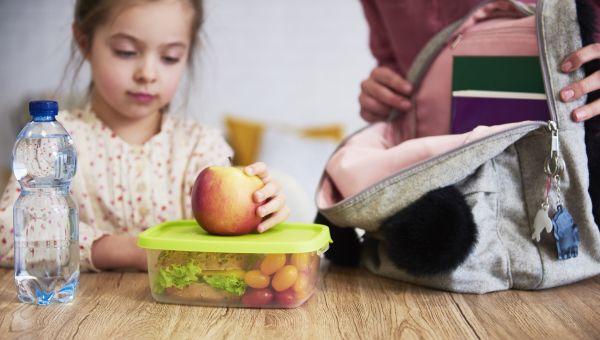
Load up their lunchbox
It’s not news that a healthy lunch is key to keep your child going throughout the day. But not all lunchbox staples are created equal. Many of kids’ favorite snacks—juice boxes, fruit snacks, even cereal bars—are packed with sugar that can leave kids feeling sluggish and cranky.
If you’re packing your child’s lunch, Kuhlmann recommends protein-rich snacks to keep them sustained for the school day, such as cheese sticks, hummus with pretzels or carrot sticks, tuna (if they’ll eat it), or apples slices with peanut butter.
If your child eats in the cafeteria, Kuhlmann says to encourage your kids to select colorful fruits and veggies, some protein and milk or water to drink.

Keep vaccines and physicals current
The best defense is a good offense—or is it the other way around? Either way, stopping sicknesses before they start is a great way to keep your kids healthy throughout the school year.
That means making sure your child is up-to-date on important immunizations. “Definitely make sure they get a flu shot every year,” says Kuhlmann. The flu alone is responsible for 38 million missed school days a year. Remember, “just because they had one last year doesn’t necessarily protect them this year.” Likewise, it’s recommended that kids aged 6 months to 17 years stay up to date with COVID-19 vaccines, another respiratory illness that can keep your child away from school.

Power down the iPad before bed
A good night’s rest is one of the most important things you can do to keep your child well. Well-rested kids retain information better, have fewer behavioral problems, and get better grades. Also, Kuhlmann says, “good quality sleep is associated with a decrease in illness.”
Try these bedtime tips to help your little one rest easier:
- Establish consistent sleep routines, during which they go to bed and wake up around the same time each day.
- Restrict caffeine after lunchtime. Kids under 12 should avoid caffeine altogether, but try to limit it for older kids, too.
- Incorporate calming activities, such as taking a warm bath and reading a book, into the nighttime routine.
- Encourage your child to shut down electronics a few hours before bedtime.
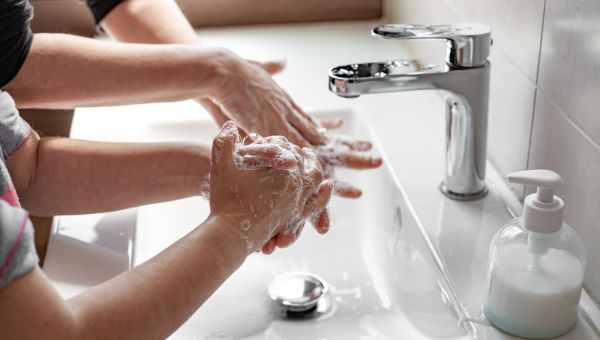
Reinforce hand washing
"Hand washing is key to preventing infections," says Kuhlmann. Keeping little hands clean during the day can reduce the risk of spreading colds by up to 21 percent, and reduce diarrheal illnesses by up to 40 percent, according to the Centers for Disease Control and Prevention.
Kuhlmann says to make sure kids are washing with soap and warm water for at least 20 seconds and scrubbing vigorously. They should wash:
- Before and after eating
- After feeding or playing with pets
- After using the restroom
- After recess or anytime they’ve been playing in a common area with other kids and toys
- After blowing their nose, coughing, or sneezing
You can’t always be there to monitor your child, so remember to practice good hand hygiene at home to reinforce the habit.
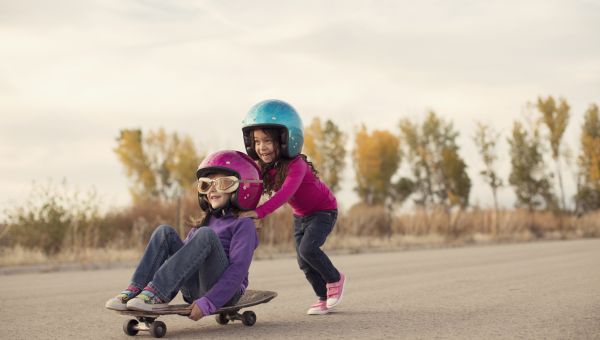
Avoid swapping hats and helmets
Whether it’s a baseball hat or a football helmet, sharing head coverings with other kids can put your child at risk for head lice—which is most prevalent in kids 3 to 11 years old. “The main thing to know is that [head lice] is common. It doesn’t mean your child is dirty,” Kuhlmann explains.
To steer clear of critters, she recommends no sharing of hats, helmets, brushes, or combs with other kids at school. If your child does contract lice, keep them home until it’s been properly treated, and remember to thoroughly wash all bedding and clothing. Make sure to notify the school of your child’s lice, as well.
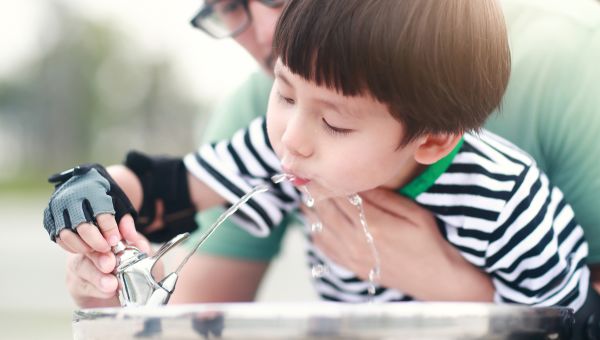
Be wary of the water fountain
These days, many teachers allow kids to carry water bottles with them to stay hydrated, but that doesn’t mean water fountains are a thing of the past.
Water fountains are often among the most germ-ridden places in a school, harboring thousands of illness-inducing microbes. What’s worse, it’s an easy way for kids to directly ingest germs into their mouths.
“I would say to avoid them if at all possible,” Kuhlmann says. “But if it’s your child’s only source of water, [tell them to] let the water run for a few seconds before he or she drinks out of it. And [remind them not to] put their mouth directly on it.”
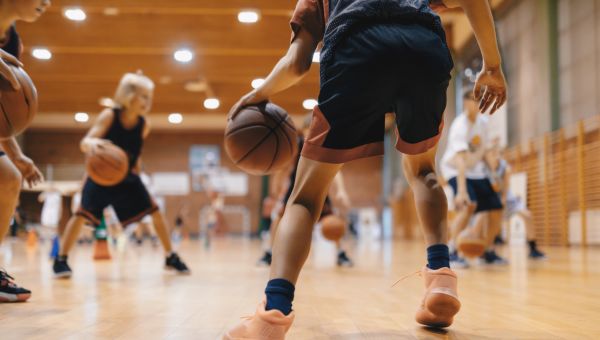
Remember ringworm
If your child’s an athlete, chances are they spend a lot of their time in the gym or locker room. It’s a great place to catch up with friends after a game, and also, unfortunately, a great place to catch ringworm—a fungal infection that causes a discolored, scaly, ring-shaped rash that itches, and is highly contagious.
Ringworm thrives in moist environments. To avoid it, Kuhlmann suggests changing into clean clothes directly after practice or a game, using shower shoes in communal locker room showers, drying off well after bathing, and not sharing towels.
Also remember to clean equipment, such as gym mats, gloves, helmets, and jerseys, thoroughly after each use.
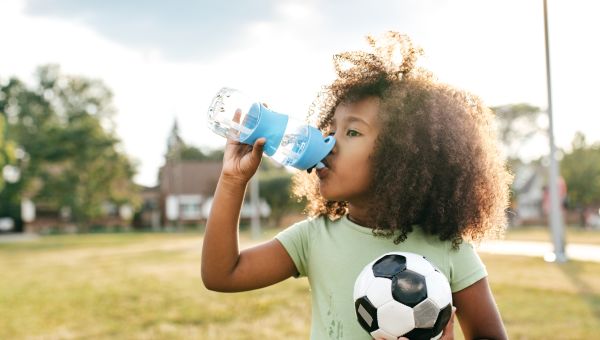
More tips
Looking for other ways to keep your child healthy this year? Kuhlmann has a few more tips for you:
- Make sure your kids aren’t eating or drinking using the same plates, silverware, cups, cartons, or bottles as their friends at school. Sharing sodas and sandwiches is a sure-fire way to spread cold-causing germs.
- Pack a water bottle. Having access to water can keep your kids hydrated throughout the day and limit their use of the water fountain.
- Teach your child to cough/sneeze into a tissue or their elbow to prevent spreading germs.

Nemours Kids Health. Playground Safety. Reviewed April 2023.
Safe Kids Worldwide. Playground Safety Tips. Accessed April 27, 2023.
Harvard TH Chan School of Public Health. Packing a Healthy Lunchbox. Accessed April 27, 2023.
Centers for Disease Control and Prevention. COVID-19: COVID-19 vaccine safety in children and teens. Page last updated July 20, 2022.
Sleep Foundation. How Blue Light Affects Kids’ Sleep. Updated March 17, 2023.
Sleep Foundation. Sleep Strategies for Kids. Updated March 29, 2023.
American Academy of Child & Adolescent Psychiatry. Caffeine and Children. July 2020.
Centers for Disease Control and Prevention. Handwashing in community settings: Show me the science. Page last reviewed September 10, 2020.
Centers for Disease Control and Prevention. Handwashing in community settings: When and How to Wash Your Hands. Last reviewed November 15, 2022.
Centers for Disease Control and Prevention. Parasites: Head lice. Page last reviewed October 15, 2019.
Centers for Disease Control and Prevention. Fungal diseases: Ringworm. Page last reviewed February 26, 2021.
More On


video

article

slideshow


video


video
